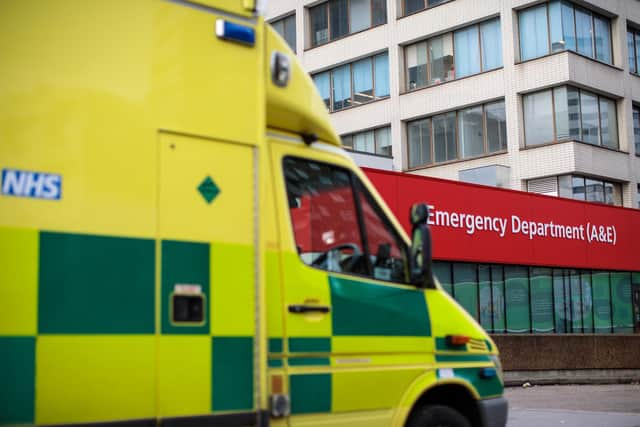Ambulance crews serving Hertfordshire were off the road for thousands of hours due to slow handovers at hospitals
and live on Freeview channel 276
Ambulance crews across the region were off the road for thousands of hours last month, while they waited to handover patients to hospital emergency departments, it has emerged.
Some ambulances have had to wait more than five hours at the Lister Hospital in Stevenage – with up to 10 ambulances waiting at the emergency department at once.
Advertisement
Hide AdAdvertisement
Hide AdAnd nationally NHS officials have instructed hospital chiefs across the country to review and address the delays.


Now the impact of ‘handover’ delays across the East of England region has been laid bare by regional ambulance boss, Tom Abell.
According to the East of England Ambulance Trust (EEAST) chief executive ‘frontline ambulances’ spent more than 12,000 hours at hospitals in October – in excess of the national handover time of 15-minutes.
That’s the equivalent of 16 ambulances being off the road for the whole of the month.
Advertisement
Hide AdAdvertisement
Hide AdMr Abell revealed the scale of the delays to a meeting of the Trust board on Wednesday (November 10).
In a written report he warned that these handover delays are having a direct impact on the number of patients who ‘have come to harm’.
And he said he was ‘extremely sorry to those patients, families and colleagues which have been affected’.
“These delays have had a direct impact on the number of patients which have come to harm and the number of Serious Incidents we have reported since June 2021, the majority of this resulting because of delays in being able to get ambulances to patients (often as a result of an ambulance waiting at hospital for handover),” says the report.
Advertisement
Hide AdAdvertisement
Hide Ad“This Board members will be as concerned and distressed as I am at the impact that this current situation is having on our ability to deliver the standard of care and I am extremely sorry to those patients, families and colleagues which have been affected.”
NHS bosses have already written to hospital trusts across the country asking them to address these ‘handover delays’.
And Mr Abell reported that in the wake of those letters he had written ‘a personal letter’ to every chief executive, ‘on actions we can support them with to improve hospital delays’.
Ongoing work by EEAST, says the report, includes developing ‘more community pathways’ and providing health care assistants to wait with patients at hospitals so ambulances can be released.
Advertisement
Hide AdAdvertisement
Hide AdIt is also reported to include work to instigate a ‘rapid drop off system’ when there are life-threatening emergencies awaiting an ambulance response in the community.
At the meeting, Mr Abell pointed to the ‘significant pressure’ the ambulance service is under – stressing that this was not just in the eastern region, but across the country.
In addition to handover delays, he pointed to factors such as staff sickness and demands for the service, particularly by the number of falls.
He pointed to a number of improvements that were being made, including plans for 100 new call handlers. And he publicly recognised the effort and commitment of Trust staff.
Advertisement
Hide AdAdvertisement
Hide AdDuring the meeting board members were also made aware of three ‘poor’ experiences across the EEAST region.
In the first example a patient – who had a punctured lung – was reported to have laid face-down on the floor for seven hours until an ambulance arrived to take him to hospital.
In the second a stroke patient waited nine hours – from 10pm to 7am – for an ambulance to arrive, despite six calls to the ambulance service.
And in the third example it was reported to have taken an hour for an ambulance to arrive at the scene of a ‘category 1’ call – when crews found the patient had died.
There was nothing in the report to suggest that any of these incidents had occurred within Hertfordshire.